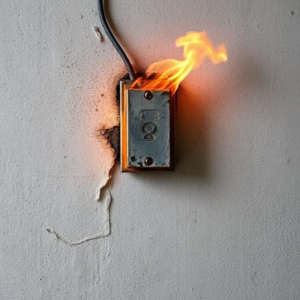Electrical fires can be unpredictable and devastating, raising critical questions such as, can you put water on an electrical fire? The answer is no—using water can make the situation worse by spreading the fire or causing electric shock. A recent report concerning Eaton Fire in LA indicates that exposed utility wires contributed to the fire, highlighting how fatal electrical failures can turn. Such incidents remind one of the ways to put out an electrical fire safely and what steps to take afterward. This guide will provide you with practical advice and safety tips to handle such emergencies effectively.
Can You Put Water on an Electrical Fire?
If you’ve ever hesitated about whether to put water on an electrical fire, it’s important to know that water should never be your first line of defense. Here’s why:
Water can conduct electric currents and cause an electric shock or exacerbate an already existing fire. Water will not quench electric fires because of the electricity flowing in them instead, it will help spread the flames. The safest methods for putting out a fire are by shutting off power and using other extinguishing agents or materials that are specially designed for this purpose.
Instead of water, here are safer alternatives to extinguish electrical fires:
- Cut the Power – If it is safer to do so, unplug the device at the outlet or turn off the power supply at the main breaker. This also lightly reduces the power source that fuels the fire.
- Use a Fire Extinguisher – For an electrical fire, use a Class C fire extinguisher and aim it at the fire’s source.
- Smother With Baking Soda – Small fires are often extinguished by baking soda. The baking soda works perfectly by cutting off oxygen.
What Sparks Electrical Fires?
Electric fires may start silently and spread suddenly. There are certain causes that, if known, can be prevented. Here are the typical causes:
Faulty Wiring

Older houses, especially those built a few decades ago, may have inadequately old electrical wiring that could not cope with a load of the power that today’s appliances consume.
Overloaded Circuits
Using high-wattage appliances can lead to sparks and fires, with overheating caused by multiple plugs overloading the power boards.
Damaged Cords
Exposed electrical wires and cables are a pretty common hazard that many people overlook. If there are any frayed, cracked insulation surfaces on wires, any flammable materials in the vicinity can easily initiate a fire.
Electrical Appliances
Faulty appliances, especially those generating heat (like space heaters or stoves), can malfunction and create fires if left unattended or poorly maintained.
By identifying these hazards, you can reduce the likelihood of an electrical fire in your home.
Steps to Extinguish an Electrical Fire Safely
No matter how small, electrical fires are dangerous and require immediate action. Here’s what you should do:
1. Stop Using Water Immediately
If your first instinct is to pour water on the flames, stop. Remember, the question, “can you put water on an electrical fire?” must always be answered with a firm no. Using water can escalate the situation by increasing your risk of injury or making the fire more severe.
2. Disconnect the Power
Cut the electricity, if it can be safely done. Unplug the faulty device, or switch off the circuit breaker in your house. This halts the current and restricts the spread of fire.
3. Target With a Fire Extinguisher
The Class C-rated fire extinguishers are the kind you use to put out fires in electrical appliances. Make sure to point the extinguisher tip at the fire’s base and pull the handle.
4. If Baking Soda Is Nearby, Use It
If you face a small fire, baking soda emits carbon dioxide that can help suffocate the flames without requiring the use of water. Pour baking soda generously onto the fire while standing at a safe distance.
5. Evacuate and Call for Help
If the fire is out of your control or escalating, evacuate immediately. Don’t attempt to fight the fire if there is heavy smoke, large flames, or spreading to walls or ceilings. Call 911 or your local emergency service right away.
Electrical Fire Safety Tips Every Homeowner Should Know
Being proactive is the best way to avoid electrical fires and reduce their impact. Follow these tips to safeguard your home:
- Use surge protectors to prevent power overloads.
- Keep flammable materials away from outlets, cords, and heaters.
- Regularly inspect appliances and wiring for signs of wear.
- Teach your family the hazards and response protocol measures for electric fire.
- Always keep a Class C fire extinguisher and baking soda easily accessible.
Electrical fires may seem threatening, but if you are knowledgeable and act quickly, they are manageable. The key point to remember is that the use of water is prohibited during this emergency. By knowing the answer to questions like can you put water on an electrical fire and understanding the right ways to extinguish it, you can reduce risks and save lives.
Preparedness is your best defense. Follow the safety guidelines, stay proactive about maintenance, and have a clear fire response plan in place. That way, you’ll be ready to handle or prevent electrical fires with confidence.
Previous